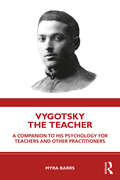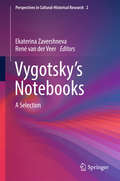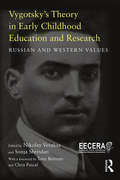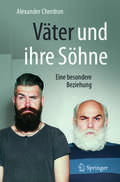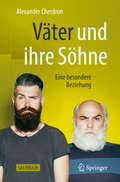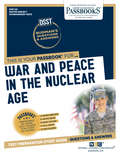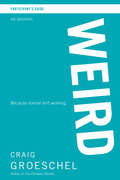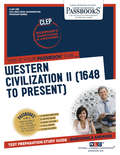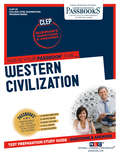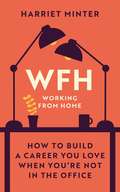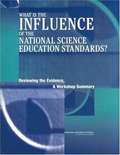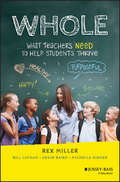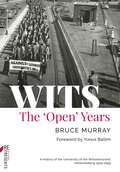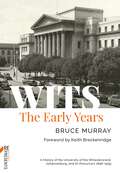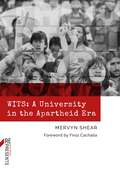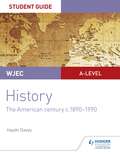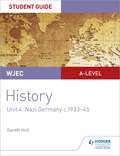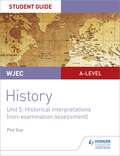- Table View
- List View
Vygotsky the Teacher: A Companion to his Psychology for Teachers and Other Practitioners
by Myra BarrsThis highly accessible guide to the varied aspects of Vygotsky’s psychology emphasises his abiding interest in education. Vygotsky was a teacher, a researcher and educational psychologist who worked in special needs education, and his interest in pedagogy was fundamental to all his work. Vygotsky the Teacher analyses and discusses the full range of his ideas and their far-reaching educational implications. Drawing on new work, research and fresh translations, this unique text foregrounds key Vygotskian perspectives on play, imagination and creativity, poetry, literature and drama, the emotions, and the role of language in the development of thought. It explains the textual issues surrounding Vygotsky’s publications that have, until recently, obscured some of the theoretical links between his ideas. It underlines Vygotsky’s determination to create a psychology that is capable of explaining all aspects of the development of mind. Vygotsky the Teacher is essential reading for students on education and psychology courses at all levels, and for all practitioners wanting to know more about Vygotsky’s theories and their roots in research and practice. It offers a unique road map of his work, connecting its different aspects, and placing them in the context of his life and the times in which he lived.
Vygotsky's Educational Theory in Cultural Context
by Alex Kozulin Boris Gindis Vladimir S. Ageyev Suzanne M. MillerInnovative ideas in educational psychology, learning, and instruction, originally formulated by Russian psychologist and educator Lev Vygotsky, are currently enjoying unprecedented popularity in the U. S. , Latin America, Europe, and Russia. An international team of scholarly contributors provides comprehensive coverage of all the main concepts of Vygotsky's sociocultural theory. They emphasize its importance for the understanding of child development, and propose specific classroom applications.
Vygotsky’s Notebooks
by René van der Veer Еkaterina ZavershnevaThis book consists of previously unpublished manuscripts by Vygotsky found in the first systematic study of Vygotsky’s family archive. The notebooks and scientific diaries gathered in this volume represent all periods of Vygotsky’s scientific life, beginning with the earliest manuscript, entitled The tragicomedy of strivings (1912), and ending with his last note, entitled Pro domo sua (1934), written shortly before his death. The notes reveal unknown aspects of the eminent psychologist’s personality, show his aspirations and interests, and allow us to gain insights into the development of his thinking and its internal dynamics. Several texts reflect the plans that Vygotsky was unable to realize during his lifetime, such as the creation of a theory of emotions and a theory of consciousness, others reveal Vygotsky’s involvement in activities that were previously unknown, and still others provide outlines of papers and lectures. The notes are presented in chronological order, preceded by brief introductions and accompanied by an extensive set of notes. The result is a book that allows us to obtain a much deeper understanding of Vygotsky’s innovative ideas.
Vygotsky’s Theory in Early Childhood Education and Research: Russian and Western Values
by Nikolay Veraksa Sonja SheridanDrawing upon in-depth analyses of Lev Vygotsky’s theories of early childhood and investigating the ways in which his ideas are reflected in contemporary educational settings, this book brings into sharp relief the numerous opportunities for preschool learning and development afforded by Vygotskian approaches. Discussion of recent developments in the understanding and implementation of Vygotsky’s ideas in Western and Russian contexts facilitates comparison, and provides readers with fresh impetus to integrate elements into their own practice. Chapters are clearly structured and address the multitude of aspects touched upon by Vygotsky, including cognitive development, communication and interaction, play, literacy and the quality of preschool settings. Providing a comprehensive exploration of current stances on Vygotsky's ideas in diverse cultural-historical contexts, Vygotsky's Theory in Early Childhood Education and Research will be of interest to researchers, practitioners, educators and politicians involved in early years education.
Väter und ihre Söhne
by Alexander CherdronDas Buch widmet sich der Vater-Sohn-Beziehung – und zwar mit Blick auf jedermann; ebenso wie es Söhnen und Vätern anregende und aufschlussreiche Lektüre sein soll, können Psychotherapeuten und Berater mit Gewinn mitlesen. Nach einem historischen Abriss der Vater-Sohn-Beziehung wird deren Wandel im Laufe der Lebensphasen für beide Beteiligten und die Veränderung der Vaterrolle, insbesondere in der jüngeren Zeit hin zum soziologischen Terminus des „modernen Vaters“, beleuchtet. Auch aktuelle Ergebnisse der Väter-Forschung finden Beachtung. Aus tiefenpsychologischer Betrachtung werden klassische Konflikte der Vater-Sohn-Beziehung aufgezeigt und mit Fallbeispielen verdeutlicht. Das Spektrum ist breit und gut lesbar: vom „Normalen“, auch gesamt-gesellschaftlich Bedeutsamen (z. B. in der aktuellen Diskussionen um die sog. Generation Y) bis hin zu den oftmals tragischen unglücklichen Folgen, pathologisch ausgetragener Vater-Sohn-Konflikte.
Väter und ihre Söhne: Eine besondere Beziehung
by Alexander CherdronDieses Sachbuch widmet sich der Vater-Sohn-Beziehung – und zwar mit Blick auf jedermann; ebenso wie es Söhnen und Vätern (und Müttern) anregende und aufschlussreiche Lektüre sein soll, können Psychotherapeuten und Berater mit Gewinn mitlesen. Es werden zunächst Aspekte beleuchtet, die Vater-Werden, Mann-Sein und Sohn-Sein heute beinhalten. Anschließend wird der Wandel der Vater-Rolle und des Vater-Bildes, insbesondere in der jüngeren Zeit, dargestellt. Untermauert durch aktuelle Ergebnisse der Väter-Forschung wird die besondere Rolle des Vaters für die Entwicklung der Söhne erläutert. Hierbei werden phasenspezifische Entwicklungsschritte und das lebenslange Wechselspiel der Gefühlswelten zwischen beiden Beteiligten „einfühlbar“. Aus tiefenpsychologischer Betrachtung werden klassische Spannungsfelder zwischen Vätern und Söhnen aufgezeigt und an Hand von Fallbeispielen verdeutlicht. Gut lesbar wird hierbei das ganze Spektrum betrachtet: von der „normalen“ Entwicklung, auch in gesamtgesellschaftlichen Kontexten, bis hin zu den oftmals tragischen Folgen unglücklich verlaufender Vater-Sohn-Beziehungen. Aus dem Inhalt: Teil I Die Vater-Sohn-Beziehung in Geschichte und Gegenwart, soziologisch und psychoanalytisch betrachtet – Teil II Kommentierte Fallgeschichten. Der Autor: Dr. med. Alexander Cherdron ist Facharzt für Allgemeinmedizin, Psychotherapeut und Psychoanalytiker in eigener Praxis in Wiesbaden.
WAR AND PEACE IN THE NUCLEAR AGE: Passbooks Study Guide (DANTES Subject Standardized Tests (DSST))
by National Learning CorporationThe DSST Subject Standardized Tests are comprehensive college and graduate level examinations given by the Armed Forces, colleges and graduate schools. These exams enable students to earn college credit for what they have learned through self-study, on the job, or by other non-traditional means. The DSST War and Peace in the Nuclear Age Passbook® prepares candidates for the DSST exam, which enables schools to award credit for knowledge acquired outside the normal classroom environment. It provides a series of informational texts as well as hundreds of questions and answers in the areas that will likely be covered on your upcoming exam.
WEIRD Participant's Guide: Because Normal Isn’t Working
by Craig GroeschelNormal people are stressed, overwhelmed, and exhausted. Many of their relationships are, at best, strained and, in most cases, just surviving. Even though we live in one of the most prosperous places on earth, normal is still living paycheck to paycheck and never getting ahead. Lust and frequent “casual” sex are far more common than purity and a healthy married sex life. And when it comes to God, the majority believe in him, but the teachings of Scripture rarely make it into their everyday lives. Simply put, normal isn’t working. In this six-session, video-based study, Groeschel’s WEIRD views will help you break free from the norm to lead a radically abnormal (and endlessly more fulfilling) life. Designed for use with the Weird DVD.
WESTERN CIVILIZATION II: Passbooks Study Guide (College Level Examination Program Series (CLEP) #Clep-29b)
by National Learning CorporationThe College Level Examination Program (CLEP) enables students to demonstrate college-level achievement and earn college credit in various subject areas based on knowledge acquired through self-study, high school and adult courses, or through professional means. The CLEP Western Civilization II (1648 to Present) Passbook® prepares you by sharpening knowledge of the skills and concepts necessary to succeed on the upcoming exam and the college courses that follow. It provides hundreds of questions and answers in the areas that will likely be covered on your upcoming exam, including but not limited to: the French Revolution; the Industrial Revolution; the World Wars; imperialism; analyzing and interpreting graphs, charts and political cartoons; identifying causes and effects of historical events; and more.
WESTERN CIVILIZATION: Passbooks Study Guide (College Level Examination Program Series (CLEP) #Dantes-60)
by National Learning CorporationThe College Level Examination Program (CLEP) enables students to demonstrate college-level achievement and earn college credit in various subject areas based on knowledge acquired through self-study, high school and adult courses, or through professional means. The CLEP Western Civilization Passbook® prepares you by sharpening knowledge of the skills and concepts necessary to succeed on the upcoming exam and the college courses that follow. It provides a series of informational texts as well as hundreds of questions and answers in the areas that will likely be covered on your upcoming exam.
WESTERN POLITICAL THOUGHT, M.A.Politics (Previous) Paper–II, SDE Andhra University
by Dr K. Ramachandra Murthy Prof Ps Reddy Dr A Venkata Rao Dr S Subba Rao Bvv BalakrishnaThis is the prescribed text book for students pursuing MA Politics Previous Paper 2 - Western Political Thought through school of distance education, Andhra University
WFH (Working From Home): How to build a career you love when you're not in the office
by Harriet Minter'Harriet Minter offers a one-stop resource for those working from home or those who want to work from home but are still sceptical.' - The Financial Times' . . . a must-read for post-Covid times.' - People Management MagazineThe no bullsh*t guide to getting your work and life on track in the new flexible workplace.Virtually every industry is making lasting changes that will open doors to a more flexible working week. So how do we adjust, thrive and excel in an environment where glitchy daily video conferences are the norm?By turns fierce, funny and highly practical, Harriet Minter will show you the skills to be effective and creative during the day-to-day. Harriet breaks down how to be an inspiring and energising manager (either remotely or to a flexibly working team), how to create and thrive in a high-trust culture (on a small and large scale) and most importantly how to achieve your ambition and propel your career forwards.Packed full of hard-won tricks, tips and tools, Harriet Minter draws on her own experience as a careers coach and adviser to companies on their flexible working culture to help you bring your best self to work - from your living room.
WFH (Working From Home): How to build a career you love when you're not in the office
by Harriet MinterThe no bullsh*t guide to getting your work and life on track in the new flexible workplace.Virtually every industry is making lasting changes that will open doors to a more flexible working week. So how do we adjust, thrive and excel in an environment where glitchy daily video conferences are the norm?By turns fierce, funny and highly practical, Harriet Minter will show you the skills to be effective and creative during the day-to-day. Harriet breaks down how to be an inspiring and energising manager (either remotely or to a flexibly working team), how to create and thrive in a high-trust culture (on a small and large scale) and most importantly how to achieve your ambition and propel your career forwards.Packed full of hard-won tricks, tips and tools, Harriet Minter draws on her own experience as a careers coach and adviser to companies on their flexible working culture to help you bring your best self to work - from your living room.(P)2021 Quercus Editions Limited
WFH (Working From Home): How to build a career you love when you’re not in the office
by Harriet MinterThe no bullsh*t guide to getting your work and life on track in the new flexible workplace.Virtually every industry is making lasting changes that will open doors to a more flexible working week. So how do we adjust, thrive and excel in an environment where glitchy daily video conferences are the norm?By turns fierce, funny and highly practical, Harriet Minter will show you the skills to be effective and creative during the day-to-day. Harriet breaks down how to be an inspiring and energising manager (either remotely or to a flexibly working team), how to create and thrive in a high-trust culture (on a small and large scale) and most importantly how to achieve your ambition and propel your career forwards.Packed full of hard-won tricks, tips and tools, Harriet Minter draws on her own experience as a careers coach and adviser to companies on their flexible working culture to help you bring your best self to work - from your living room.
WHAT IS THE INFLUENCE OF THE NATIONAL SCIENCE EDUCATION STANDARDS?: Reviewing the Evidence, A Workshop Summary
by Karen S. HollwegThe Influence of the National Science Education Standards
WHOLE: What Teachers Need to Help Students Thrive
by Rex Miller Bill Latham Kevin Baird Michelle KinderA shocking statistic in education reveals that 70% of K-12 teachers work under chronic stress. This revolutionary new book explains how removing stress from the classroom holds the key to improving education. The book also explains what administrators, teachers, parents, and communities can do to help accomplish a stress-free classroom. For years, the expert voices said “disengagement” was the crucial issue behind poor educational environments and results. Naturally, only massive reform could fix it. But what if the enormous restructuring and expenditures attacked the wrong problem? MindShift, an organization that reframes tired and clogged conversations, pushed the old conclusions off the table and started fresh. They gathered diverse leaders in education, leadership, neuroscience, architecture, and wellness in working forums around the nation. These pivotal meetings produced WHOLE, a game-changing approach to education. This book captures the story and details of how the system can be remade for real and lasting benefits to everyone. With the authors’ expertise, the book exposes the exhausted and antiquated thinking that led to the present crisis. But, WHOLE also proposes a new era of disruptive change that can produce happier, healthier, and more successful education for the 21st century. The book introduces the outliers, tells the stories, and presents the roadmaps to: Why teachers should be seen as high-performance athletes, requiring time for recovery and preparation How schools can become “field hospitals,” combining learning with healing Why space matters, how redesigning and refurnishing schools can eliminate stress and produce learning environments that are more open and inviting Ways to properly integrate schools within communities, building honest relationships, increasing social capital, and achieving transparency that increases success Packed with real-life examples, new research, and solutions that you can introduce to your own schools, students, and communities, WHOLE shows us how to move schools from the age of stress and insecurity to an age of true educational flourishing.
WITS: A History of the University of the Witwatersrand, Johannesburg 1939-1959
by Bruce MurrayIn the period between the outbreak of World War II in 1939 and the enactment of university apartheid by the Nationalist Government in 1959, the University of the Witwatersrand, Johannesburg (Wits) developed as an ‘open university’, admitting students of all races. This, the second volume of the history of Wits by historian Bruce Murray, has as its central theme the process by which Wits became ‘open’, the compromises this process entailed, and the defence the University mounted to preserve its ‘open’ status in the face of the challenges posed by the Nationalist Government.The University’s institutional autonomy is highlighted by Yunus Ballim in his preface to the centenary edition of WITS: The ‘Open’ Years. He writes: ‘The emerging posture of a university willing to rise in defence of academic freedom was important because this was to become infused into the institutional culture of Wits.’The book looks at the University’s role in South Africa’s war effort, its contribution to the education of ex-volunteers after the war, its leading role in training job-seeking professionals required by a rapidly expanding economy, and the rise of research and postgraduate study. Students feature prominently through their political activities, the flourishing of a student intelligentsia, the heyday of the Remember and Give (Rag) parade, rugby intervarsity, and the stunning success of Wits sportsmen and women. WITS: The ‘Open’ Years paints a vivid picture of the range of personalities who enlivened the campus – among them some well-known figures in the new South Africa.The book includes chapters by Alf Stadler, who was Professor of Political Studies at Wits and the author of The Political Economy of Modern South Africa, and Jonty Winch, former Sports Officer at Wits and the author of Wits Sport.
WITS: A History of the University of the Witwatersrand, Johannesburg, and its Precursors 1896-1939
by Bruce MurrayWITS: The Early Years is a history of the University up to 1939. First established in 1922, the University of the Witwatersrand, Johannesburg developed out of the South African School of Mines in Kimberley circa 1896. Examining the historical foundations, the struggle to establish a university in Johannesburg, and the progress of the University in the two decades prior to World War II, historian Bruce Murray captures the quality and texture of life in the early years of Wits University and the personalities who enlivened it and contributed to its growth.Particular attention is given to the wider issues and the challenges which faced Wits in its formative years. The book examines the role Wits came to occupy as a major centre of liberal thought and criticism in South Africa, its contribution to the development of the professions of the country, the relationship of its research to the wider society, and its attempts to grapple with a range of peculiarly South African problems, such as the admission of black students to the University and the relations of English- and Afrikaans-speaking white students within it.This edition of WITS: The Early Years is republished in the University’s centenary year with a preface by Keith Breckenridge, who writes, ‘In the republication of Murray’s two volume history of Wits, readers have an opportunity to explore the often dramatic and contested story of this university … Murray produced an intimate, almost scandalous intellectual history of the institution that served as his home for practically half a century.’
WITS: A University in the Apartheid Era
by Mervyn ShearWhen the National Government assumed power in 1948, one of the earliest moves was to introduce segregated education. Its threats to restrict the admission of black students into the four ‘open universities’ galvanised the staff and students of those institutions to oppose any attempt to interfere with their autonomy and freedom to decide who should be admitted. In subsequent years, as the regime adopted increasingly oppressive measures to prop up the apartheid state, opposition on the campuses, and in the country, increased and burgeoned into a Mass Democratic Movement intent on making the country ungovernable. Protest escalated through successive states of emergency and clashes with police on campus became regular events. Residences were raided, student leaders were harassed by security police and many students and some staff were detained for lengthy periods without recourse to the courts. First published in 1996, WITS: A University in the Apartheid Era by Mervyn Shear tells the story of how the University of the Witwatersrand (Wits) adapted to the political and social developments in South Africa under apartheid. This new edition is published in the University’s centenary year with a preface by Firoz Cachalia, one of Wits’ student leaders in the 1980s. It serves as an invaluable historical resource on questions about the relationship between the University and the state, and on understanding the University’s place and identity in a constitutional democracy.
WJEC A-level History Student Guide Unit 3: The American century c.1890-1990
by Haydn DaveyExam board: WJECLevel: AS/A-levelSubject: HistoryFirst teaching: September 2015First exams: Summer 2016 (AS); Summer 2017 (A-level)Build, reinforce and revise the historical knowledge and exam skills required for WJEC AS/A-level History.Matched to the 2016 specification for Wales, this study guide contains clear content summaries and annotated sample answers to exam questions.- Concisely covers the key issues and content in the specification, breaking the Unit down into manageable chunks- Consolidates understanding with regular knowledge-check questions, plus useful tips- Builds the analytical and evaluative skills that students need to succeed in AS/A-level History- Improves students' exam technique, providing sample student answers to past paper questions, with commentary to explain the number of marks awarded- Helps students to learn the content throughout the course, study independently and revise for their exams
WJEC A-level History Student Guide Unit 4: Nazi Germany Epub
by Gareth HoltExam board: WJECLevel: AS/A-levelSubject: HistoryFirst teaching: September 2015First exams: Summer 2016 (AS); Summer 2017 (A-level)Build, reinforce and revise the historical knowledge and exam skills required for WJEC AS/A-level History.Matched to the 2016 specification for Wales, this study guide contains clear content summaries and annotated sample answers to exam questions.- Concisely covers the key issues and content in the specification, breaking the Unit down into manageable chunks- Consolidates understanding with regular knowledge-check questions, plus useful tips- Builds the analytical and evaluative skills that students need to succeed in AS/A-level History- Improves students' exam technique, providing sample student answers to past paper questions, with commentary to explain the number of marks awarded- Helps students to learn the content throughout the course, study independently and revise for their exams
WJEC A-level History Student Guide Unit 4: Nazi Germany c.1933-1945
by Gareth HoltExam board: WJECLevel: AS/A-levelSubject: HistoryFirst teaching: September 2015First exams: Summer 2016 (AS); Summer 2017 (A-level)Build, reinforce and revise the historical knowledge and exam skills required for WJEC AS/A-level History.Matched to the 2016 specification for Wales, this study guide contains clear content summaries and annotated sample answers to exam questions.- Concisely covers the key issues and content in the specification, breaking the Unit down into manageable chunks- Consolidates understanding with regular knowledge-check questions, plus useful tips- Builds the analytical and evaluative skills that students need to succeed in AS/A-level History- Improves students' exam technique, providing sample student answers to past paper questions, with commentary to explain the number of marks awarded- Helps students to learn the content throughout the course, study independently and revise for their exams
WJEC A-level History Student Guide Unit 4: Nazi Germany c.1933-1945
by Gareth HoltExam board: WJECLevel: AS/A-levelSubject: HistoryFirst teaching: September 2015First exams: Summer 2016 (AS); Summer 2017 (A-level)Build, reinforce and revise the historical knowledge and exam skills required for WJEC AS/A-level History.Matched to the 2016 specification for Wales, this study guide contains clear content summaries and annotated sample answers to exam questions.- Concisely covers the key issues and content in the specification, breaking the Unit down into manageable chunks- Consolidates understanding with regular knowledge-check questions, plus useful tips- Builds the analytical and evaluative skills that students need to succeed in AS/A-level History- Improves students' exam technique, providing sample student answers to past paper questions, with commentary to explain the number of marks awarded- Helps students to learn the content throughout the course, study independently and revise for their exams
WJEC A-level History Student Guide Unit 5: Historical Interpretations (non-examination assessment)
by Phil StarExam board: WJECLevel: AS/A-levelSubject: HistoryFirst teaching: September 2015First exams: Summer 2016 (AS); Summer 2017 (A-level)Maximise your chance of coursework success with this step-by-step guide to the WJEC A-level History NEA.- Explains how to understand, approach and successfully answer the question/essay title, with tips to highlight important information and common pitfalls- Develops students' skills in analysing and evaluating primary source material- Teaches students how to identify and test the validity of historical interpretations- Offers extensive advice on essay writing, including drafting an effective introduction and conclusion- Provides one complete example of the NEA with annotations/commentary that show how it could be improved- Keeps students on track as they complete activities that help to structure their progress
